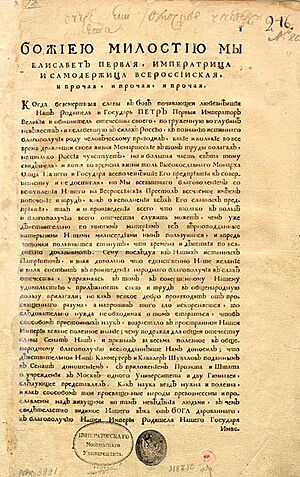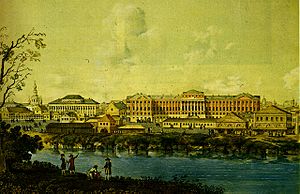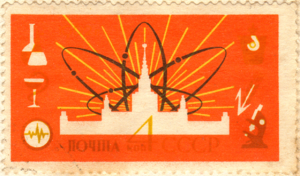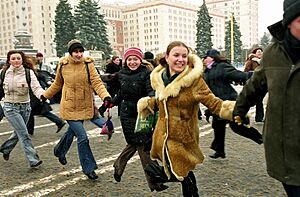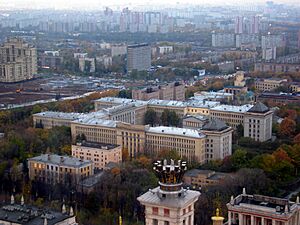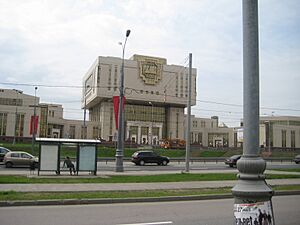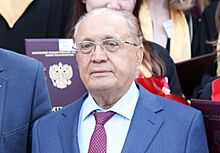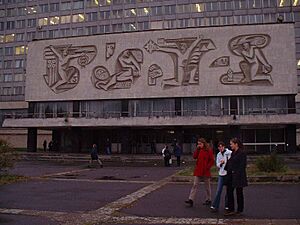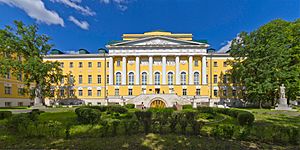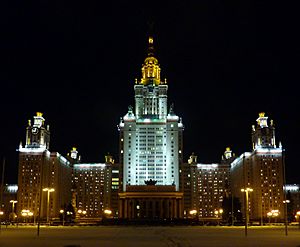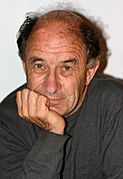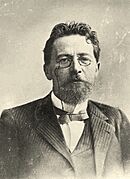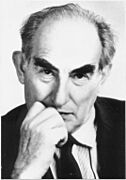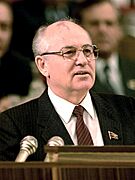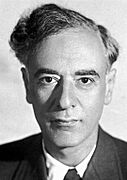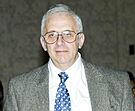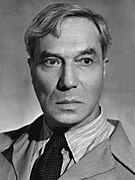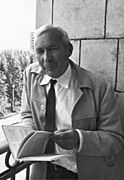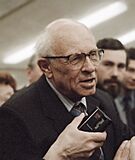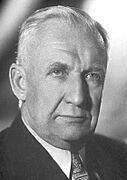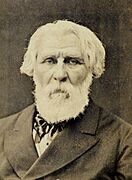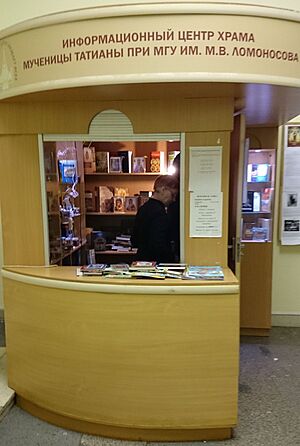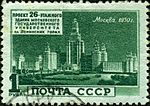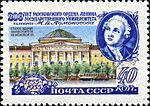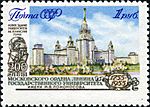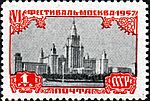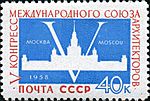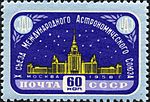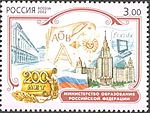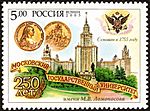Moscow State University facts for kids
|
Московский государственный университет имени М. В. Ломоносова
|
|
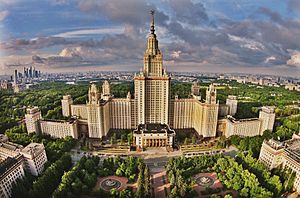
Moscow State University Main Building
|
|
|
Former name
|
Imperial Moscow University |
|---|---|
| Motto |
Наука есть ясное познание истины, просвещение разума
|
|
Motto in English
|
Science is clear knowledge of the truth, enlightenment of the mind Scientia est clara cognitio veritatis, illustratio mentis (Latin) |
| Type | Public research university |
| Established | 23 January 1755 |
| Founder | Mikhail Vasilyevich Lomonosov[1] and Ivan Shuvalov [2] |
| Rector | Viktor Sadovnichiy |
|
Academic staff
|
5,000 |
| Students | 39,282 |
| Location |
,
Russia
55°42′14″N 37°31′43″E / 55.7039°N 37.5286°E |
| Campus | Urban |
| Language | Russian |
| Colors | |
| Affiliations | Association of Professional Schools of International Affairs (cancelled in 2022) Institutional Network of the Universities from the Capitals of Europe (suspended in 2022) International Forum of Public Universities |
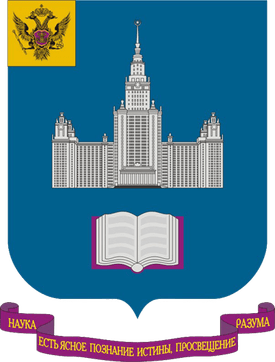 |
|
|
Building details
|
|
| General information | |
| Completed | 1953 |
| Height | |
| Architectural | 240 m (787 ft) |
| Top floor | 214 m (702 ft) |
| Technical details | |
| Floor count | 42 |
| Floor area | 1,000,000 m2 (10,763,910.417 sq ft) |
Moscow State University (MSU) is a very old and important university in Moscow, Russia. Its full name is M. V. Lomonosov Moscow State University. It is a public university that focuses on research.
MSU is a huge place! It has 15 research centers and 43 different departments, called faculties. More than 300 smaller groups, called departments, are also part of it. Many famous people have studied here, including leaders and scientists. As of 2019, 13 Nobel Prize winners and six Fields Medal winners were connected to the university.
Contents
History of Moscow State University
How the University Started
The idea for a university in Moscow came from Ivan Shuvalov and Mikhail Lomonosov. They convinced Empress Elizabeth to create it. She signed a special paper on January 23, 1755.
The very first classes were held on May 7, 1755. Moscow State University and Saint Petersburg State University both say they are the oldest university in Russia.
MSU first started in a building on Red Square. This was from 1755 to 1787. Later, Catherine the Great moved the university to a new building. This building was designed by Matvei Kazakov. It had to be rebuilt after a big fire in Moscow in 1812.
In the 1700s, the university had three main study areas: philosophy, medicine, and law. A special school for noblemen was also started in 1779 by Mikhail Kheraskov. The university also had its own printing press. It published the first newspaper in Imperial Russia, called Moskovskie Vedomosti.
In 1911, many scientists and professors left the university. This was a protest about how the government treated them and students. Thousands of students were also asked to leave.
Moscow State University in the 20th Century
Changes After 1917
After the big changes in Russia in 1917, the university started letting in students from all backgrounds. Before, it was mostly for richer families. In 1919, they stopped charging tuition fees. They also created special classes to help working-class students get ready for entrance exams. The university grew a lot during the 1920s and 1930s.
Later Years (1950-1999)
After 1991, nine new faculties (departments) were added to the university. The university also got a special status. This meant it received money directly from the government, not through the Ministry of Education.
In 1997, a famous French musician, Jean Michel Jarre, held a huge concert. He used the front of the university's main building as a backdrop. Half a million people came to watch!
Recent Times (2000-Present)
In 2008, a very powerful supercomputer called SKIF MSU was launched at the university. It was the fastest supercomputer in the Commonwealth of Independent States at that time.
In March 2022, the rector (head) of Moscow State University, Viktor Sadovnichy, signed a public statement. This statement supported the 2022 Russian invasion of Ukraine. Because of this, some universities around the world stopped working with Moscow State University. For example, Yale University and the University of St Andrews suspended their partnerships. Big computer chip companies like Intel and AMD also stopped sending their products to Russia.
Campus and Buildings
Since 1953, most of the university's departments have been on Sparrow Hills. This is in the southwest part of Moscow. After World War II, Joseph Stalin ordered seven tall, grand buildings to be built in Moscow. The main building of MSU was one of these. It was the tallest building in Europe until 1990. The central part of the building is 240 meters (787 feet) tall and has 36 floors.
Inside the main building, you'll find the university's offices. There is also the Museum of Earth Sciences. The departments of Mechanics and Mathematics, Geology, Geography, and Fine and Performing Arts are also there. Other university buildings are located in different parts of Moscow. Some are near Manege Square. MSU also has campuses in other countries like Kazakhstan and Uzbekistan.
Faculties (Departments)
As of 2009, Moscow State University had 39 faculties and 15 research centers. A faculty is like a large department that focuses on a specific area of study. Here are some of them:
- Faculty of Mechanics and Mathematics
- Faculty of Computational Mathematics and Cybernetics
- Faculty of Physics
- Faculty of Chemistry
- Faculty of Biology
- Faculty of History
- Faculty of Economics
- Faculty of Law
- Faculty of Journalism
- Faculty of Psychology
- Institute of Asian and African Countries
- Faculty of Political Science
- Faculty of Fine and Performing Arts
- Graduate School of Television
Research Centers
MSU also has many important research centers where scientists work on new discoveries. Some of these include:
- Skobeltsyn Institute of Nuclear Physics
- Institute of Mechanics
- Sternberg Astronomical Institute
- Research Computing Center
University Reputation
| University rankings | |
|---|---|
| Global – Overall | |
| ARWU World | 101–150 (2024) |
| QS World | =94 (2025) |
| THE World | =107 (2025) |
Moscow State University is known around the world. In 2024, it was ranked among the top 101-150 universities globally by the Academic Ranking of World Universities. It was also ranked 94th by QS World University Rankings in 2025.
The university works with many other universities worldwide. They exchange students and teachers. It also hosts special courses for people from different countries.
Staff and Students
The university has more than 4,000 teachers and professors. About 15,000 people work to support the university. Around 5,000 researchers work in its research centers.
More than 40,000 undergraduate students study at MSU. Also, about 7,000 students are working on advanced degrees. Each year, about 2,000 students and researchers from other countries come to study here.
Famous People from MSU
| Notable alumni of Moscow State University |
|---|
Many famous people have studied or worked at Moscow State University. As of 2017, 13 Nobel Prize winners and 6 Fields Medal winners were connected to the university.
Some famous writers who studied here include Anton Chekhov, Boris Pasternak, and Ivan Turgenev. Important politicians like Mikhail Gorbachev also attended MSU. Many great mathematicians and physicists, such as Vladimir Arnold and Andrei Sakharov, are also alumni.
Religious Organizations
Even though Russian law usually doesn't allow religious groups to operate directly inside universities, there are two Orthodox churches at Moscow State University. These are the house church of the Martyr Tatiana and the church of the Holy Equal-to-the-Apostles Cyril and Methodius.
Moscow State University on Stamps
- Russian and Soviet stamps
-
1958 postage stamp:
V Congress of the International Union of Architects -
1958 postage stamp:
X Congress of the International Astronomical Union in the new university building
See also
 In Spanish: Universidad Estatal de Moscú para niños
In Spanish: Universidad Estatal de Moscú para niños
- Education in Russia
- List of universities in Russia
- List of rectors of Moscow State University
 | Jessica Watkins |
 | Robert Henry Lawrence Jr. |
 | Mae Jemison |
 | Sian Proctor |
 | Guion Bluford |


